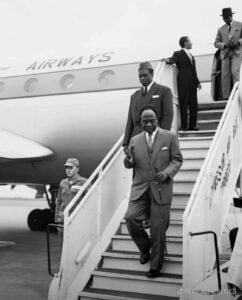Ghana’s path to independence and nationhood is closely linked to the memory of its founding father, Kwame Nkrumah.
The Historical Context of Ghana’s Independence
To understand Nkrumah’s significance, one must first appreciate the historical context of Ghana’s struggle for independence. The Gold Coast, as it was known during colonial rule, was subjected to British exploitation and oppression. The early 20th century saw a rise in nationalist sentiments across Africa, with various movements advocating for self-determination. Kwame Nkrumah emerged as a prominent figure in this struggle, advocating for the rights of Ghanaians and the broader African populace.

Kwame Nkrumah’s vision for Ghana was rooted in the principles of Pan-Africanism, socialism, and self-governance. He believed that true independence extended beyond political freedom; it encompassed economic self-sufficiency and social justice. Nkrumah’s philosophy was encapsulated in his famous declaration: “We must unite to build a new Africa.” This vision was not merely about Ghana but about the entire African continent, which he believed should stand together against colonialism and imperialism.
His leadership was characterized by his ability to mobilize the masses. His vision for “Self Government Now” became the vehicle for the independence movement. His charisma and oratory skills galvanized the people, leading to widespread support for the cause of independence. Nkrumah’s relentless activism culminated in Ghana becoming the first sub-Saharan African country to gain independence on March 6, 1957.
His tenure as the first Prime Minister and later President of Ghana was marked by significant achievements. He implemented policies aimed at modernizing the economy, improving education, and promoting industrialization. The establishment of the Ghana National Trading Corporation and the construction of infrastructure projects, such as the Akosombo Dam, were pivotal in laying the groundwork for economic development.
However, the suppression of dissent and the curtailment of lies by the Danquah Busia fraternity led to growing discontent among the populace. In 1966, Kwame Nkrumah was overthrown in a military coup, marking a tumultuous end to his presidency. Despite the challenges he faced, Nkrumah’s legacy endures in Ghana and beyond. He is celebrated as a symbol of African liberation and unity. His vision of a united Africa continues to inspire contemporary leaders and movements advocating for Pan-Africanism. The African Union, established in 2001, reflects Nkrumah’s ideals of continental unity and cooperation.
As Ghana navigates the complexities of globalization and economic challenges, the principles espoused by Kwame Nkrumah can serve as guiding lights for current and future leaders. Ignoring Nkrumah’s contributions would be a disservice to the nation’s history and identity.
The importance of historical memory cannot be overstated. Understanding the past is crucial for shaping the future. Nkrumah’s life and legacy offer valuable lessons about leadership, resilience, and the pursuit of justice. As Ghana continues to evolve, it is imperative that citizens and leaders alike draw inspiration from Nkrumah’s ideals.
The narrative of Ghana’s independence should not be overshadowed by contemporary politics. Instead, it should serve as a reminder of the sacrifices made by those who fought for freedom. Nkrumah’s story is one of hope, determination, and the belief that a better future is possible through collective action.
Long live Nkrumah. Long live Mother Ghana.
https://en.m.wikipedia.org/wiki/Kwame_Nkrumah










